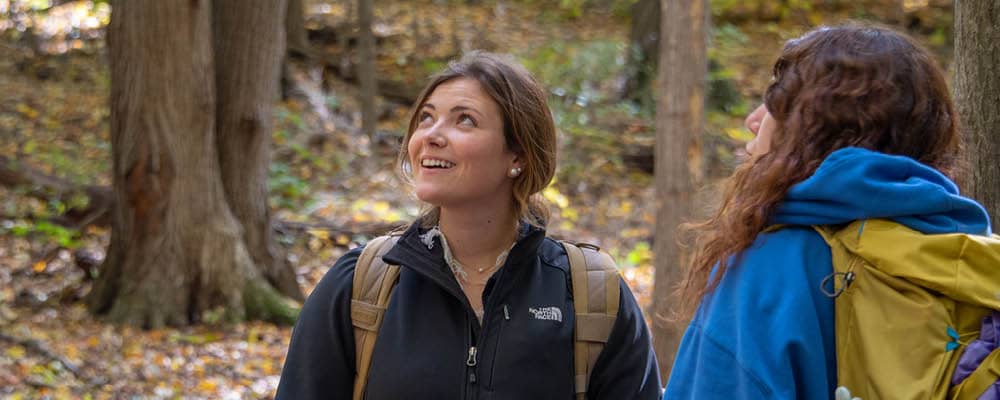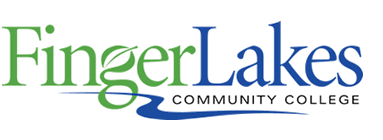Natural Resources Conservation
Associate in Applied Science (A.A.S.)

Learn about the environment in a region known for its rich natural resources. Studying conservation at FLCC combines hands-on training at regional outdoor classrooms and wildlife centers with courses in biology and environmental science.
Career Outlook: Environmental Conservation
Careers in natural resources conservation are as abundant and diverse as the environment itself. Finger Lakes Community College is one of the most successful colleges in the state of New York at placing graduates in highly competitive conservation positions. Graduates of our natural resources conservation program hold jobs in the field in more than 25 states and are employed by federal, state, local, and private agencies.
A.A.S. Program Overview
The natural resources conservation program at FLCC integrates diverse field experiences with classroom study. It will offer you a broad awareness of environmental issues and in addition will provide you with an appreciation of our natural world. Courses in field botany, terrestrial and aquatic ecology, soils, waters and forests, fish and wildlife, and environmental science provide theoretical basis for what is learned outside the classroom.
Furthermore, while enrolled in the program, you will have the opportunity to use industry-standard research technology such as electro-fishing equipment, water quality probes, GIS computer software, and wildlife tracking radio-telemetry devices.
Outdoor Education and Research Facilities
Study in our research facilities designed for environmental and wildlife education. FLCC's main campus in Canandaigua has an on-site arboretum and greenhouse, as well as multiple wildlife observation blinds. The 250-acre campus is home to second-growth woodlands, wetlands, nature trails, and fields in various states of natural succession. You'll even spend time on the water, joining your classmates and FLCC faculty on our research vessels — including a state-of-the-art electrofishing boat.
You'll receive an exceptional outdoor learning experience at our two field stations in the Finger Lakes, including:
- The Muller Field Station, located on the southern end of Honeoye Lake, where you can participate in lab work, help in the fish hatchery, and engage in community outreach and local research projects.
- The East Hill Campus, located near the High Tor Wildlife Management area in Naples, where you can take part in camping, hiking, wildlife, and nature classes.
A.A.S. Program Outcomes
Program Learning Outcomes
Upon completion of this degree program, students will be able to:
- Utilize current, relevant, and standardized methods and technology appropriate to various fields.
- Identify flora and fauna in the field based on (suites of) morphological characteristics.
- Collect, analyze and explain data using discipline specific terminology.
- Demonstrate development of essential career skills (e.g. job searching, interviewing, resume writing, technical writing, continual professional improvement).
Career Pathways
Graduates of the program hold positions with the New York State Department of Environmental Conservation, United States Fish and Wildlife Services, and the National Park Service, where they serve as:
- Environmental Conservation Officer
- Environmental Educator
- Fish and Wildlife Technician
- Land Manager
- Park Ranger
Others work for research facilities and private companies with career such as:
- Environmental Conservation Technician
- Environmental Risk Manager
- Fisheries/Wildlife Biologist
- Soil and Water Technician
- Water Treatment Plant Manager
- Wildlife and Fish Technician
Seamless Transfer Opportunities
Graduates of the program have successfully transferred to a variety of institutions, including:
- Colorado State University
- Cornell University
- Northland College in Minnesota
- Penn State University
- Rochester Institute of Technology
- SUNY College of Environmental Science and Forestry
- SUNY Colleges at Brockport, Cortland, and Cobleskill
- Unity College in Maine
- University of New Hampshire
- University of Rochester
- Universities of Utah, Montana, and Idaho
Low-Cost Tuition and Scholarship Opportunities
Earn a quality education at an affordable rate. With our low cost-per-credit and general scholarship opportunities, you can maximize your potential with minimal debt. 76% of students are eligible for scholarships or financial aid that help with the cost of college.
Faculty
Our natural resources conservation faculty have a wide range of environmental expertise. They have earned graduate degrees from institutions such as Lehigh University, SUNY Brockport, and SUNY College of Environmental Science and Forestry. Complementing decades of experience teaching at the college level, our faculty have lived all over the country working in the conservation field.
Adjunct faculty teach specialty classes, with diverse backgrounds that include resource professionals for the U.S. Fish and Wildlife Service and the New York State Department of Environmental Conservation.
A.A.S. Program Details

Explore Your Career Options
Map out a path toward your future career, and discover opportunities related to this area of study.
